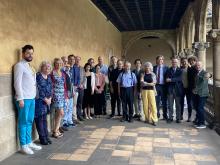A colloquium at the intersection of law, society, and cognition: integrating sociological and philosophical paradigms with the cognitive sciences
Coordinators: Luigi Cominelli (Università degli Studi di Milano), Daniele Velo Dalbrenta (Università di Verona), Giovanni Bombelli (Università Cattolica di Milano)
Description of the meeting
The interdisciplinary crossings between legal sociology, philosophy/legal realism, and cognitive science is a crossroads that holds great potential for advancing our understanding of the legal system and its interactions with society and the individual.
One key area of inquiry is the study of legal reasoning and decision-making. Research in cognitive science has revealed that human reasoning and decision-making are influenced by a variety of factors, including emotions, biases, and heuristics. These factors can lead to errors in judgment and decision-making, which can have significant consequences in legal contexts.
Legal realism, with its emphasis on the study of the actual functioning of the legal system, can provide a framework for understanding these biases and heuristics and for developing methods to mitigate their effects.
Sociological research on the law has also highlighted the ways in which legal systems are shaped by social and cultural factors. Research has shown that legal systems are often influenced by the dominant culture and values of a society and that legal outcomes can vary significantly depending on the race, gender, and socioeconomic status of the individuals involved. This research can inform the development of legal and social policies that are designed to be more inclusive and equitable.
Moreover, the field of sociology can provide a framework for understanding the ways in which legal norms are created and enforced in society. Research in sociology has shown that legal norms are not simply imposed from above, but are rather shaped by the interactions between individuals and groups. This research can inform the development of legal and social policies that are designed to be more responsive to the needs and concerns of the individuals and groups affected by them.
The workshop conveners invite papers that explore the intersections and relationships between these areas of study.
Potential topics for papers include, but are not limited to:
- The cognitive biases and heuristics that influence legal decision-making
- The ways in which social and cultural factors shape legal systems
- The impact of legal and social policies on human cognition and behavior
- The impact of neuroscience in the context of criminal and civil justice
- The relationship between the social sciences and the cognitive sciences in the context of civil rights and social justice
We welcome submissions from researchers in law, philosophy of law, sociology, cognitive science, neuroscience, and related fields.
The structure of the workshop will be organized around 4 main streams:
- Law, society and cognition
- Legal realism and cognition
- Legal philosophy, language and cognition
- Law, neuroscience and cognition
Our experience in Oñati
The Colloquium at the Intersection of Law, Society, and Cognition (integrating sociological and philosophical paradigms with the cognitive sciences) was inspired by Giovanni Bombelli (University of Milan-Cattolica) and co-organized by Daniele Velo Valbrenta (University of Verona) and Luigi Cominelli (University of Milan-Statale), taking place in the beautiful setting of the Antigua Universidad in Oñati, Gipuzkoa, and hosted by the impeccable staff of the International Institute for the Sociology of Law. Academics and researchers from various fields and disciplines (as the name of the conference suggests) were involved and attended the final two-day meeting, coming from nine different countries and from both hemispheres.
The ample time given to each presentation allowed a lot of fruitful debate, and the seed for future collaborations was implanted. The outcome of the meeting was considered very stimulating by all participants, and a decision was taken to submit a proposal for a special issue of the journal Oñati Socio-Legal Series. Everybody appreciated the Basque welcoming atmosphere and expressed the wish to participate in another similar initiative in the near future!
Workshop Coordination Team
Avenida de la Universidad, 8
Apartado 28
20560 Oñati (Gipuzkoa) - Spain
T: +34 943 78... Ver teléfono
E: workshop@iisj.es




